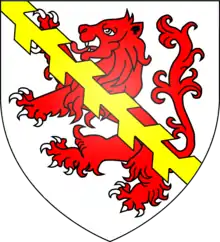
Nicholas Steward (born 1547, baptized 16 May 1547, died 1 June 1633) of Taplow in Buckinghamshire, later of Hartley Mauditt in Hampshire,[2] was an English politician who sat in the House of Commons in 1604.
Origins
Steward was the seventh son of Simeon Steward of Lakenheath, Suffolk. His eldest brother was Sir Mark Steward (d.1603), MP.[3] The family, formerly known also as "Styward", claimed descent[4] from a younger son of Alexander Stewart, 4th High Steward of Scotland (d. 1283) (from the elder two sons of whom descended the Stuart kings of Scotland and England) as is described on the monument in Ely Cathedral of Sir Mark Steward (d.1603), but which connection has been disproven by modern historians[5][6] and suspected as a fabrication by his relative Robert Steward (d. 1557), the last Prior of Ely Abbey and the first Dean of Ely Cathedral, "a time-serving prior who assigned generous tracts of dean and chapter lands within the Isle of Ely to numerous relatives".[7]
Career
He matriculated at Trinity College, Cambridge at Easter 1560 and was a student at Trinity Hall, Cambridge in August 1564. He was awarded LL.B. in 1568 and was admitted as an advocate on 29 October 1573. In 1574 he was awarded LL.D.[8] In 1604, Steward was elected as one of the first Members of Parliament for the newly created constituency of Cambridge University.[8] Steward purchased the Manor of Hartley Mauditt, Hampshire, in 1603 from the Lancaster Family.
Marriage and issue
In 1572 he married Frances Baker (d.19 March 1609), a daughter and co-heiress of John Baker of Cambridge, a cousin of Matthew Parker, Archbishop of Canterbury.[9] His grandson was Sir Nicholas Steward, 1st Baronet (1618-1710) [10] "Baronet of Hartley Mauditt", of Pylewell Park in Hampshire, whose descendants adopted the surname "Stuart".
Death and burial
He died in 1633[8] and was buried in the Church of St Martin-in-the-Fields near Westminster[11] and at his request[12] a monument to him was erected in St. Leonard's Church, Hartley Mauditt.
References
- ↑ Archaeologia: Or Miscellaneous Tracts Relating to Antiquity, 1777, pp.183-5
- ↑ History of Parliament
- ↑ History of Parliament
- ↑ See pedigree: Clay, J. W., ed. (1897). The Visitation of Cambridge made in Anno 1575, continued and enlarged with the Visitation of the same county made by Henery St George, Richmond Herald, marshall and deputy to Willm. Camden, Clarenceulx, in Anno 1619, with many other descents added thereto. Harleian Society, 1st ser. 41. London, p.7
- ↑ Archaeologia: Or Miscellaneous Tracts Relating to Antiquity, 1777, pp.183-5
- ↑ Round, J. Horace, Studies in Peerage and Family History, London, 1907, pp.115-146
- ↑ STEWARD, Sir Simeon (1575-1632), of Stuntney, Cambs. Published in The History of Parliament: the House of Commons 1604-1629, ed. Andrew Thrush and John P. Ferris, 2010
- 1 2 3 "Steward, Nicholas (STWT560N)". A Cambridge Alumni Database. University of Cambridge.
- ↑ History of Parliament
- ↑ History of Parliament
- ↑ STEWARD, Nicholas (1547-1633), of Taplow, Bucks., Hartley Mauditt, Hants and Doctors' Commons, London; formerly of Bagshott and Pirbright, Surr. Published in The History of Parliament: the House of Commons 1604-1629, ed. Andrew Thrush and John P. Ferris, 2010
- ↑ History of Parliament